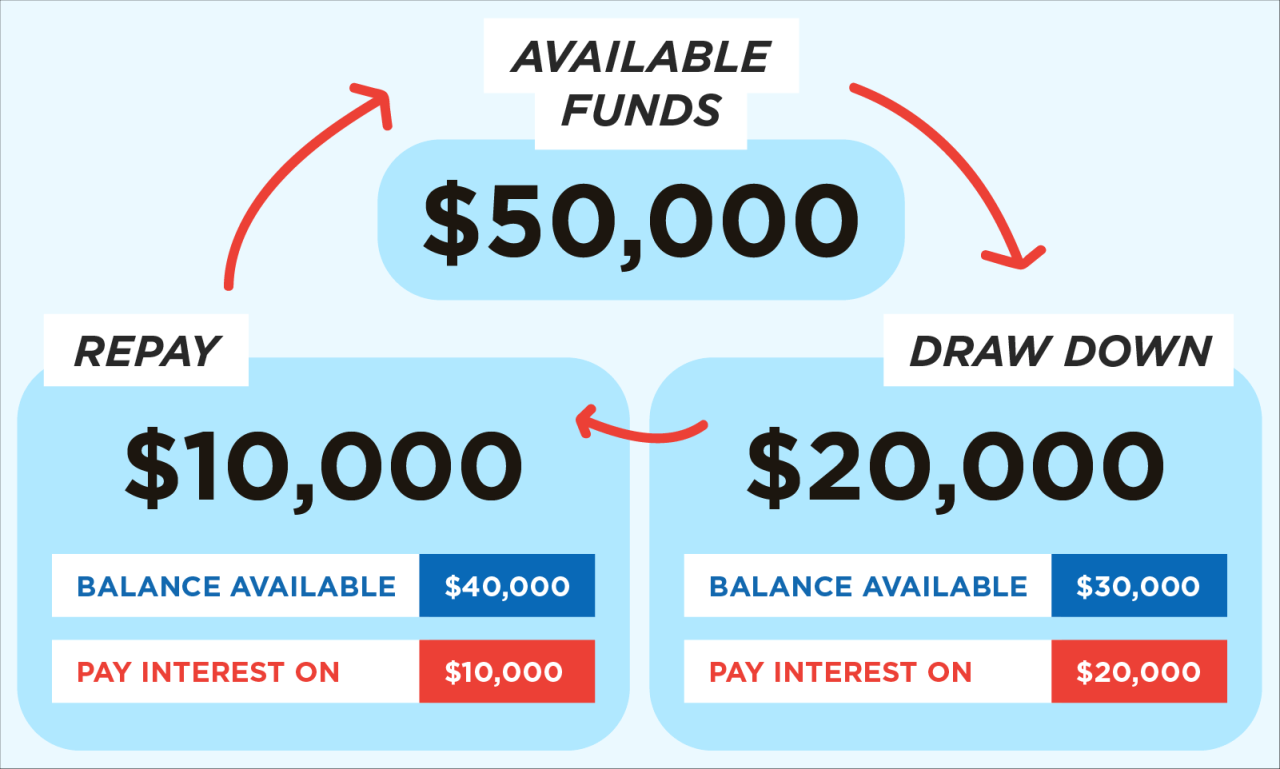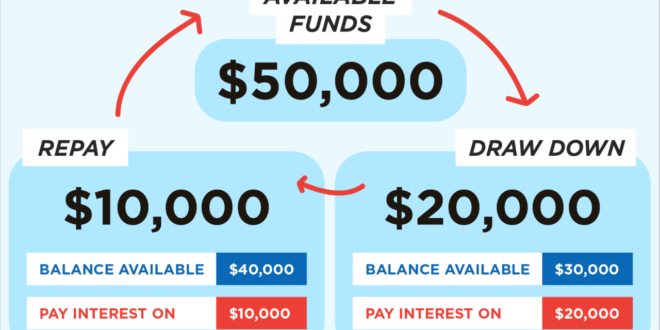Can i use personal line of credit for business – Can I use a personal line of credit for business? This is a question many entrepreneurs and small business owners ask themselves, especially when starting out or facing unexpected financial challenges. While it might seem like a convenient solution, using a personal line of credit for business purposes comes with its own set of risks and benefits. This article will explore the potential advantages and disadvantages, offering a comprehensive guide to help you make an informed decision.
Understanding the key features of personal lines of credit, such as interest rates and repayment terms, is crucial. Additionally, we’ll delve into the potential legal and tax implications of using a personal line of credit for business, highlighting the importance of consulting with financial and legal professionals. We’ll also discuss alternative business financing options, such as SBA loans, term loans, and business credit cards, to help you determine the best path for your specific needs.
Understanding Personal Lines of Credit
A personal line of credit, often referred to as a credit line or revolving credit, is a flexible borrowing option that allows you to access funds as needed, up to a pre-approved limit. This type of credit offers several benefits, including convenience, flexibility, and potential interest savings.
Key Features of a Personal Line of Credit
A personal line of credit offers several key features that make it a desirable borrowing option.
- Revolving Credit: Unlike a traditional loan, where you borrow a fixed amount and repay it in installments, a personal line of credit allows you to borrow funds as needed, up to your approved credit limit. You can then repay the borrowed amount over time, and the credit limit is replenished as you make payments.
- Interest Charges: You only pay interest on the amount you borrow, not on the entire credit limit. Interest rates typically vary based on your creditworthiness, the lender’s current rates, and other factors.
- Variable Interest Rates: Personal lines of credit typically have variable interest rates, which means the rate can fluctuate over time based on market conditions. This can make budgeting challenging, as your monthly payments may change.
- Credit Limit: Your credit limit represents the maximum amount you can borrow at any given time. The credit limit is determined by your credit history, income, and other factors.
- Annual Fees: Some personal lines of credit may charge annual fees, which can add to the overall cost of borrowing.
Interest Rates and Repayment Terms
Interest rates on personal lines of credit vary widely, depending on factors such as your credit score, the lender, and current market conditions.
- Credit Score: Individuals with higher credit scores typically qualify for lower interest rates, reflecting their lower risk to lenders.
- Lender: Different lenders have different interest rate policies. It’s important to compare offers from multiple lenders to find the best rate.
- Market Conditions: Interest rates can fluctuate based on broader economic conditions. When interest rates rise in the overall economy, personal line of credit rates may also increase.
Repayment terms for personal lines of credit are typically flexible, allowing you to repay the borrowed amount over a specific period.
- Minimum Payment: You’ll usually be required to make a minimum payment each month, which may cover a portion of the interest accrued and a small amount of the principal borrowed.
- Repayment Period: The repayment period for a personal line of credit can vary, but it’s typically longer than the term for a traditional loan.
- Early Repayment: You can often repay your personal line of credit early without penalty, potentially saving on interest charges.
Common Uses for Personal Lines of Credit
Personal lines of credit are versatile financial tools that can be used for various purposes.
- Home Improvements: Personal lines of credit can be used to finance home renovations, repairs, or upgrades. This can be a convenient way to access funds without taking out a separate home equity loan.
- Debt Consolidation: If you have high-interest debt, a personal line of credit can help you consolidate your debt into a single, lower-interest loan. This can simplify your payments and potentially save you money on interest.
- Unexpected Expenses: Personal lines of credit can provide a financial safety net for unexpected expenses, such as medical bills, car repairs, or emergency travel costs.
- Large Purchases: Personal lines of credit can be used to finance large purchases, such as furniture, appliances, or vacations. This can be a more flexible option than a traditional loan, allowing you to borrow only the amount you need.
Using Personal Lines of Credit for Business Purposes

Using a personal line of credit for business financing can be a tempting option, especially for startups or small businesses seeking quick and flexible funding. However, it’s crucial to understand the potential risks and benefits before making a decision.
Potential Risks and Benefits
Using a personal line of credit for business purposes can have both advantages and disadvantages.
- Benefits:
- Quick and Easy Access to Funds: Personal lines of credit are generally easier to obtain than traditional business loans, with less paperwork and faster approval times.
- Flexibility: You can draw on the line of credit as needed, giving you more control over your cash flow.
- Lower Interest Rates: Personal lines of credit often have lower interest rates than business loans, especially if you have good credit.
- Risks:
- Personal Liability: Using a personal line of credit for business purposes exposes your personal assets to risk if your business fails. This means creditors can pursue your personal assets, such as your home or car, to recover outstanding debts.
- Credit Score Impact: Defaulting on a personal line of credit can negatively impact your personal credit score, making it difficult to secure future loans or credit cards.
- Limited Funding: Personal lines of credit typically have lower credit limits than business loans, which may not be sufficient for significant business expenses.
- Tax Implications: Interest paid on personal lines of credit used for business purposes may not be tax-deductible, unlike business loans.
Situations Where Using a Personal Line of Credit Might Be Suitable
While using a personal line of credit for business purposes can be risky, there are situations where it might be a viable option:
- Short-Term Funding Needs: If you require a small amount of funding for a short period, a personal line of credit can be a quick and convenient solution. For example, you might use it to cover a temporary cash flow shortfall or bridge the gap until you receive a larger business loan.
- Early-Stage Startups: Startups often face challenges in securing traditional business loans due to their lack of established credit history or collateral. A personal line of credit can provide them with initial funding to get their business off the ground. However, it’s crucial to be aware of the personal liability involved.
- Business Expansion: If you have a well-established business with good credit, a personal line of credit could be used to fund a modest expansion or investment, especially if you need funding quickly.
Potential Consequences of Mixing Personal and Business Finances
Mixing personal and business finances can lead to several complications:
- Financial Confusion: It can be challenging to track your business expenses and income separately from your personal finances, leading to inaccurate accounting and financial planning.
- Tax Complications: Mixing personal and business finances can make it difficult to determine your business income and expenses for tax purposes, potentially leading to audits and penalties.
- Increased Risk: Mixing personal and business finances exposes your personal assets to business risks, such as lawsuits or debt collection efforts.
Alternatives to Personal Lines of Credit for Business Financing

While personal lines of credit can be a convenient option for short-term business financing needs, it’s crucial to explore other alternatives that might be more suitable and beneficial for your business in the long run. These alternatives offer tailored financing solutions that cater to the specific requirements of your business, potentially providing better terms, lower interest rates, and enhanced flexibility.
Comparing Business Loan Options
Understanding the nuances of various business loan options is essential for making informed decisions. Here’s a breakdown of some popular choices:
- SBA Loans: Backed by the Small Business Administration (SBA), these loans offer favorable terms, including lower interest rates and longer repayment periods. They are designed to support small businesses and are typically available through banks and other lending institutions. SBA loans often require a strong credit score and a well-developed business plan.
- Term Loans: These loans provide a fixed amount of money with a predetermined repayment schedule. They are often used for specific business purposes, such as purchasing equipment or expanding operations. Term loans typically have fixed interest rates and can be secured or unsecured, depending on the lender’s requirements.
- Business Credit Cards: These cards offer revolving credit lines, allowing businesses to make purchases and pay them off over time. They can be convenient for short-term financing needs and can offer rewards programs or cash back incentives. However, it’s crucial to manage credit card debt responsibly, as high interest rates can accumulate quickly.
Factors to Consider When Choosing a Business Financing Option
When selecting the best financing option for your business, consider these key factors:
- Loan Amount: Determine the exact amount of funding required to achieve your business goals. Different loan options have varying limits, so choose one that aligns with your needs.
- Interest Rates: Compare interest rates across various lenders and loan types. Aim for the lowest possible rate to minimize financing costs.
- Repayment Terms: Evaluate the repayment schedule, including the loan term and monthly payments. Choose terms that fit your cash flow and financial projections.
- Credit Score: Lenders typically assess your credit score to determine your eligibility and interest rates. Building a strong credit history can enhance your chances of securing favorable terms.
- Collateral Requirements: Some loans require collateral, such as equipment or real estate, to secure the loan. Understand the collateral requirements and ensure you can meet them.
- Fees and Charges: Be aware of any associated fees, such as origination fees, closing costs, or annual fees. Factor these costs into your overall financing decision.
Comparing Key Features of Different Business Loan Options
| Feature | SBA Loans | Term Loans | Business Credit Cards |
|---|---|---|---|
| Loan Amount | Up to $5 million | Varies based on lender | Varies based on credit limit |
| Interest Rates | Typically lower than traditional loans | Fixed or variable rates | High interest rates, often variable |
| Repayment Terms | Longer repayment periods | Fixed repayment schedule | Revolving credit line, pay over time |
| Credit Score Requirements | Strong credit score required | Varies based on lender | Good credit score generally required |
| Collateral Requirements | May or may not require collateral | Often secured by collateral | Unsecured |
| Fees and Charges | Origination fees, closing costs | Origination fees, closing costs | Annual fees, late payment fees |
Legal and Tax Implications
Using a personal line of credit for business purposes can have significant legal and tax implications. It is crucial to understand these implications and consult with qualified professionals to ensure you are operating within the law and maximizing your tax benefits.
Tax Implications, Can i use personal line of credit for business
Understanding the tax implications of using a personal line of credit for business purposes is crucial. It involves navigating the distinction between personal and business expenses and ensuring compliance with tax regulations.
The IRS classifies business expenses as deductible if they are “ordinary and necessary” for carrying on a trade or business. This means that expenses directly related to your business operations, such as rent, utilities, and supplies, are generally deductible. However, using a personal line of credit for business purposes blurs the lines between personal and business expenses, making it essential to track and document all transactions accurately.
- Interest Deductions: The interest you pay on a personal line of credit used for business purposes may be deductible as a business expense. However, this deduction is subject to limitations and may require specific documentation. The IRS allows a deduction for interest paid on debt used to acquire or improve income-producing property, but there are limits on the amount that can be deducted.
- Recordkeeping: Maintaining detailed records of all business transactions, including those related to your personal line of credit, is essential for tax purposes. This includes receipts, invoices, and bank statements. Accurate recordkeeping allows you to substantiate business expenses and minimize the risk of tax audits.
- Self-Employment Taxes: If you are self-employed and use a personal line of credit for business purposes, you may be subject to self-employment taxes on your business income. These taxes include Social Security and Medicare taxes and are calculated on your net earnings from self-employment.
Legal Implications
Using a personal line of credit for business purposes can also have legal implications. It is essential to understand the potential risks and liabilities associated with this practice.
- Personal Liability: Using a personal line of credit for business purposes exposes you to personal liability for business debts. This means that creditors can pursue your personal assets, such as your home or car, to recover unpaid business debts.
- Contractual Obligations: When using a personal line of credit for business purposes, it is crucial to ensure that you are meeting all contractual obligations with the lender. This includes making timely payments and adhering to the terms of the loan agreement. Failure to meet these obligations can result in penalties, including late fees and increased interest rates.
- Compliance with Laws and Regulations: Businesses operating in the United States are subject to a wide range of federal, state, and local laws and regulations. It is crucial to ensure that your business practices, including the use of personal lines of credit, comply with all applicable laws and regulations.
Consulting Professionals
Consulting with a financial advisor and/or tax professional is crucial when using a personal line of credit for business purposes. They can provide valuable guidance on the legal and tax implications of this practice, ensuring you are operating within the law and maximizing your tax benefits.
- Financial Advisor: A financial advisor can help you assess your financial situation, determine the appropriate amount of debt to take on, and develop a plan for managing your finances. They can also help you understand the risks and benefits of using a personal line of credit for business purposes.
- Tax Professional: A tax professional can help you understand the tax implications of using a personal line of credit for business purposes, including the potential deductions and tax liabilities. They can also help you structure your business transactions to minimize your tax burden.
Building Business Credit

Building and maintaining a strong business credit score is crucial for your company’s financial health. A good business credit score opens doors to various financing options, such as business loans, lines of credit, and credit cards, at favorable terms. It also enhances your reputation and credibility among suppliers, vendors, and potential investors.
Steps for Building Business Credit
Building business credit takes time and effort. Here are some key steps you can take to establish a positive credit history for your business:
- Obtain a Business Credit Report: Start by getting a copy of your business credit report from the three major credit bureaus: Experian, Equifax, and Dun & Bradstreet. Review the report carefully for any errors or inaccuracies and dispute them promptly.
- Establish Business Credit Accounts: Open business credit accounts, such as business credit cards, lines of credit, or business loans. These accounts allow you to build a credit history and demonstrate your ability to manage credit responsibly.
- Use Business Credit Wisely: Pay your business credit accounts on time and in full each month. Avoid maxing out your credit limits and strive to keep your credit utilization ratio low.
- Report Your Business Payments: Ensure that all your business payments are reported to the credit bureaus. This helps build a comprehensive credit history and improves your business credit score.
- Monitor Your Business Credit Regularly: Check your business credit report periodically to ensure accuracy and identify any potential issues. This allows you to address problems early on and prevent negative impacts on your credit score.
Obtaining a Business Credit Card
Obtaining a business credit card can be a valuable step in establishing business credit. Here’s a step-by-step guide:
- Research and Compare Options: Explore different business credit card providers and compare their terms, fees, and rewards programs. Consider factors such as annual fees, interest rates, credit limits, and benefits.
- Gather Necessary Documents: Prepare the required documentation, such as your business’s tax identification number (TIN), articles of incorporation, bank statements, and personal credit history.
- Submit an Application: Complete the application form online or through a bank branch. Be accurate and truthful when providing information.
- Review and Accept Terms: Carefully review the credit card agreement and terms before accepting the offer. Understand the interest rates, fees, and other conditions.
- Activate Your Card: Once approved, activate your business credit card and start using it for business expenses.
Conclusive Thoughts
In conclusion, while using a personal line of credit for business might seem appealing, it’s important to weigh the potential risks and benefits carefully. Understanding the legal and tax implications, as well as the importance of building business credit, is essential. Exploring alternative business financing options can provide a more sustainable and secure path for your business’s growth. Remember, seeking professional advice from financial advisors and tax professionals can help you navigate the complexities of business financing and ensure you make informed decisions for your company’s success.
FAQ Compilation: Can I Use Personal Line Of Credit For Business
What are the potential risks of using a personal line of credit for business?
Using a personal line of credit for business can put your personal finances at risk if your business fails. It can also impact your personal credit score and limit your access to future personal loans.
How do I build business credit?
Building business credit involves establishing a separate credit history for your business. This can be done by obtaining a business credit card, paying your business bills on time, and establishing business relationships with vendors and suppliers.
What are the tax implications of using a personal line of credit for business?
The interest you pay on a personal line of credit used for business expenses may be deductible as a business expense. However, you’ll need to consult with a tax professional to determine your specific tax obligations.
What is the difference between a personal line of credit and a business loan?
A personal line of credit is a loan based on your personal credit history, while a business loan is based on your business’s credit history. Business loans typically have higher interest rates but offer larger loan amounts.
Is it always a bad idea to use a personal line of credit for business?
While it’s generally not recommended, using a personal line of credit for business might be a suitable option in some situations, such as short-term funding needs or for a well-established business with a strong personal credit score. However, it’s important to carefully evaluate the risks and consult with financial professionals.
 Norfolk Publications Publications ORG in Norfolk!
Norfolk Publications Publications ORG in Norfolk!

